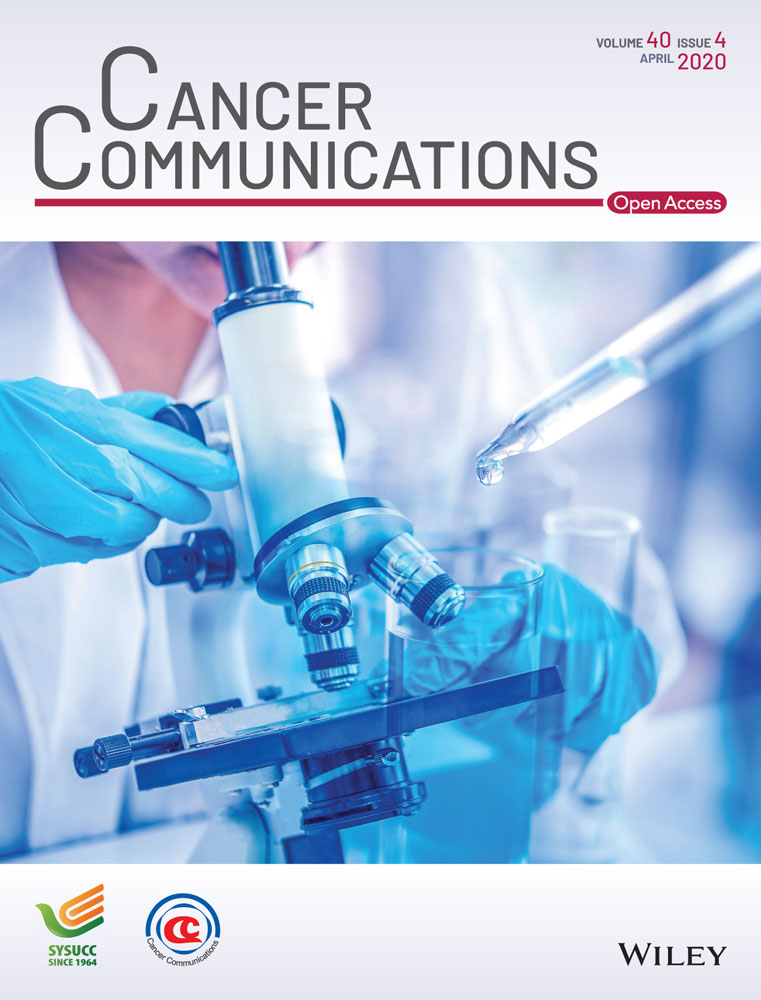Safety and efficacy of toripalimab in advanced gastric cancer: A new clinical trial bringing hope for immunotherapy in gastric cancer
Abbreviations
-
- GC
-
- gastric cancer
-
- PD-1
-
- programmed death-1
-
- PD-L1
-
- programmed cell death ligand 1
-
- XELOX
-
- oxaliplatin plus capecitabine
Epidemiological data indicate that gastric cancer (GC) remains highly prevalent in the world, although its global incidence is declining [1]. It is the third leading cause of cancer death and a significant health burden in China [2-4]. At the time of diagnosis, around 50% of GC cases are already locally advanced or metastatic [5, 6] and can no longer be considered for curative surgical treatment [7]. The prognosis for these patients is poor [4]. Previous studies efforts have mainly focused on the improvements in chemotherapy and targeted therapy of advanced GC. So far, scientists have only found a few reagents that have shown to be effective against GC. However, the survival of GC patients treated with these reagents is marginal [8]. Therefore, novel therapeutic approaches to treat GC are urgently required.
The success of immunotherapeutic strategies in other solid tumors, such as programmed death-1 (PD-1) blockade therapy, allow us to assert that immunotherapies can be a promising treatment strategies for advanced GC. Indeed, clinical trials (KEYNOTE-012 [9] and KEYNOTE-059 [10]) have shown that pembrolizumab, a humanized antibody PD-1 antibody, has a favorable safety profile and robust anti-tumor activity in programmed cell death ligand 1(PD-L1) positive advanced GC patients. Recently, another PD-1 antibody, nivolumab, has also been demonstrated to have similar efficacy in treating chemotherapy-refractory PD-L1 non-selected advanced GC patients [11]. However, in the KEYNOTE-061 trial [12], pembrolizumab failed to provide a survival benefit over paclitaxel in advanced GC patients who had progressed after receiving first-line treatment with fluoropyrimidine and platinum [12]. Thus, further development for immunotherapy reagents with higher efficacy to treat advanced gastric cancer is warranted.
Toripalimab is the first humanized antibody against PD-1 that has been approved by the China Food and Drug Administration for clinical trials [13]. It was approved for the treatment of unresectable or metastatic treatment-refractory melanoma in 2018 based on its safety and efficacy profile [14]. However, whether toripalimab is safe and effective in treating GC patients remains unknown. But now, based on a reported study entitled “Safety, efficacy and tumor mutational burden as a biomarker of overall survival benefit in chemotherapy-refractory gastric cancer treated with toripalimab, a PD-1 antibody in phase Ib/II clinical trial NCT02915432,” published in Annals of Oncology [15], the safety and efficacy of this novel anti-PD-1 antibody has been evaluated in chemotherapy-refractory advanced GC.
In that study, the authors enrolled 58 chemotherapy-refractory advanced GC patients and 18 chemotherapy-naive GC patients from 18 participating centers. In the chemotherapy-refractory cohort, patients with advanced GC received toripalimab-monotherapy (3 mg/kg, D1, Q2W). Their median treatment duration was 2.7 months (range: 0.4-19.7 months). Forty-five (77.6%) patients experienced treatment-related adverse events. Among them, 13 (22.4%) patients experienced grade 3 or higher treatment-related adverse events. Four (6.9%) patients discontinued due to treatment-related adverse events. Treatment-related deaths occurred in 2 (3.4%) patients. Fifteen (25.9%) patients experienced immune-related adverse events. The objective response rate was 12.1% and the disease control rate was 39.7%. The median progression-free survival was 1.9 months and median overall survival was 4.8 months. In chemotherapy-naive cohort, advanced GC patients received a combination of toripalimab (360 mg, D1) with oxaliplatin (130 mg/m2 QD, D1) and capecitabine (1000 mg/m2 BID, D1-D14) of a 3-week treatment cycle. The median treatment duration was 6.7 months (range: 0.7-9.5 months). Treatment-related adverse events of any grade occurred in 17 (94.4%) patients. Grade 3 and higher treatment-related adverse events occurred in 7 (38.9%) patients. Four (22.2%) patients discontinued due to treatment-related adverse events. There was no immune-related adverse events and treatment-related death. The objective response rate was 66.7% and the disease control rate was 88.9%. Moreover, the authors further evaluated the correlation between toripalimab efficacy and several biomarkers including PD-L1 expression, tumor mutational burden, and Epstein-Barr virus DNA copy number. Their results indicated that only high tumor mutational burden was the predictive biomarker for overall survival in toripalimab treated GC patients.
Although the advanced GC patients from different regions receive the same standard treatment, their clinical outcomes are different. One of the reasons for this difference is that patients with GC in different regions have different genetic characteristics. Therefore, for the first time, the authors explored the safety and efficacy of checkpoint blockade immunotherapy as monotherapy or combination therapy with oxaliplatin plus capecitabine (XELOX) in Chinese GC patients. In this study described, toripalimab exhibited tolerated cytotoxicity and long-lasting anti-tumor activity, especially in high tumor mutational burden patients. The combination of toripalimab with XELOX as a first-line treatment, for safety and efficacy, is currently being explored in a randomized phase III trial by the authors in advanced GC.
ETHICS APPROVAL AND CONSENT TO PARTICIPATE
Not applicable.
DECLARATIONS: AUTHORS’ CONTRIBUTIONS
The author read and approved the final manuscript.
ACKNOWLEDGMENTS
Not applicable.
COMPETING INTERESTS
The author declares no competing interests.
AVAILABILITY OF DATA AND MATERIALS
Not applicable.
CONSENT FOR PUBLICATION
Not applicable.
FUNDING
Not applicable.




